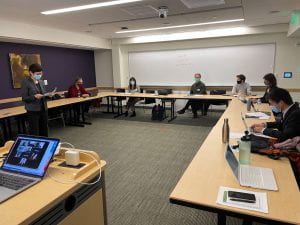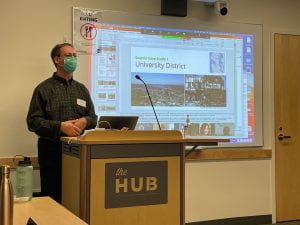The Adaptable Cities team was excited to host a project kick-off meeting at the University of Washington campus in mid-October, signaling anticipation ahead of the project’s November start date. This meeting served to introduce the team to initial project stakeholders and identify synergies across the research objectives and stakeholders’ interests. The team was joined by representatives from commerce, transportation, and food system agencies in both Washington and Arizona.

Participants attending in-person and virtually share introductions and preview the day’s agenda.
The kick-off meeting consisted of an introduction and overview of the project’s four thrusts, and opportunity to hear comments and suggestions from stakeholders, and a team discussion about bridging thrust efforts and incorporating stakeholder input. As a result, the meeting generated a number of insights for the Adaptable Cities team.
Discussions throughout the day made it clear that key vocabulary carried multiple meanings across the project’s intersecting disciplines (e.g. ‘resilience’, ‘adaptability’, ‘robustness’). Looking forward, this realization means that particular attention must be paid to language as the team communicates internally and with various stakeholders.

Professor Daniel Abramson (University of Washington, Urban Design and Planning) introduces one of the project’s proposed case study areas.
One of the major insights gleaned from the kick-off meeting is that the team should pursue a clearer understanding of the underlying policy and governmental decision-making processes that relate to the project, especially the pathways for change. A number of strategies were offered to begin this task, such as reviewing relevant municipal codes and multiple agencies’ contingency plans for system-wide disruption (e.g. the Seattle Department of Transportation’s Snow Routes Plan). An investigation of these policies and processes will then go on to inform the project’s constraints and parameters.
In addition to this feedback, the team also learned that defining the area of interest with an ecosystem approach (identify the study area boundary and investigate everything there within), rather than setting out with predefined constraints on what aspects of the food system to include, would allow the team to explore a comprehensive network of food availability in a study area. This approach empowers the team to investigate nodes in the food network that may have otherwise been excluded, such as dollar stores and movie theatres.
Since the success of the kick-off meeting, project members across the partner institutions have begun research activities toward their respective thrusts. The whole project team meets on a biweekly basis, offering progress updates and discussing questions or challenges that arose in the previous weeks. The team is currently developing a stakeholder plan which will help to structure the project’s engagement activities through its duration and ensure that collaboration is meaningful for not only the team, but for stakeholders as well.